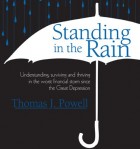BY JOHN SEELMEYER
ELP Capital Inc. of Reno seeks regulatory
approval for two investment funds that will
target well-heeled sophisticated individual
investors.
Thomas Powell, the chief executive officer
of ELP Capital Inc., says the funds mark an
effort to jump-start the northern Nevada economy
by channeling local investment dollars
into local projects.
The company last week filed a notice with
the U.S. Securities and Exchange Commission
that it believes the two funds are exempt from
securities regulations because they will be sold
to a limited number of investors or to buyers
who meet the SEC’s standards for accredited
investors. (Those standards include net worth
and annual income for individual investors.)
The ELP Strategic Asset Fund LLC has
raised $450,000 so far, the company said in an
SEC filing. There’s no maximum size on the
fund, and minimum investments are set at
$250,000.
A second fund, ELP Opportunity Fund 1—
GBLL LLC, is planned to raised $2.3 million.
So far, $100,000 has been raised.Minimum
investment in the fund is $50,000.
ELP Capital, incorporated in 2004, has
managed debt and equity financing of real
estate. The company traces its beginnings to
IntoHomes LLC, a residential mortgage lender
launched by Powell in 1999.
Along with Powell, its board includes Jesse
Haw, president of Hawco Properties of Spanish
Springs, and Bob Barone, chairman of Ancora
West Trust Co. in Reno.
Powell, who’s also an author of books and
articles, has argued recently that private
investors can play a major role in getting the
construction and development markets moving
again if they’ll fund stalled quality projects.
“This recession … left a stockpile of quality
real-estate projects to collect dust.Without
proper funding, the projects remain undeveloped,
unproductive and severely underemployed.
Placing our private capital into quality
projects will bolster the number of available
jobs in our communities and get people
behind a meaningful cause,” he wrote in an
essay this month.
ELP Capital expects to charge an annual
management fee of 1 percent of the funds’
assets, and it also may collect a performance
fee.
Along with the two investment funds, ELP
Capital last week filed SEC paperwork for
exempt offerings of securities in two real estate
funds.
One of the filings covers ELP Mortgage
Fund III — The Ridges LLC. The company
said $2.1 million of the $2.5 million fund has
been sold to accredited investors.
The second filing covered ELP Acquisition
Fund—Citi Centre LLC, which has raised
about $3.28 million of a $4.5 million offering.




 With a bad habit of ignoring profound systemic problems, Federal Treasury officials are now securing a system that encourages the same careless risk-taking that originally got us into this mess. With this week marking the one-year anniversary since Lehman Brothers imploded, it is only appropriate to discuss the faulty system that protects and rewards failing financial institutions.
With a bad habit of ignoring profound systemic problems, Federal Treasury officials are now securing a system that encourages the same careless risk-taking that originally got us into this mess. With this week marking the one-year anniversary since Lehman Brothers imploded, it is only appropriate to discuss the faulty system that protects and rewards failing financial institutions.